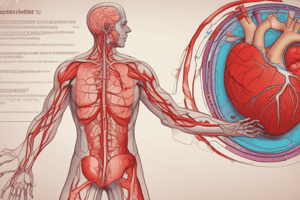Podcast
Questions and Answers
What are the potential consequences of having high blood pressure?
What are the potential consequences of having high blood pressure?
Too much pressure against vessels can cause them to rupture.
What are the main functions of blood in the body?
What are the main functions of blood in the body?
To transport nutrients, gases & waste products, transport chemical messengers, maintain constant temperature and blood pressure, and protect against blood loss & pathogens or toxins.
How does anemia affect the body?
How does anemia affect the body?
Anemia occurs when there aren't enough red blood cells, which can lead to fatigue and weakness.
What could a higher than average white blood cell count indicate?
What could a higher than average white blood cell count indicate?
What are the potential consequences of having low blood pressure?
What are the potential consequences of having low blood pressure?
What are the main functions of blood in the body?
What are the main functions of blood in the body?
What are the components of blood and their respective proportions?
What are the components of blood and their respective proportions?
How does anemia affect the body?
How does anemia affect the body?
What does a higher than average white blood cell count indicate?
What does a higher than average white blood cell count indicate?
Explain the potential consequences of having high blood pressure on blood vessels.
Explain the potential consequences of having high blood pressure on blood vessels.
How does maintaining a constant temperature contribute to the proper functioning of enzymes in the body?
How does maintaining a constant temperature contribute to the proper functioning of enzymes in the body?
What is the significance of the proportion of RBC (erythrocytes) in blood?
What is the significance of the proportion of RBC (erythrocytes) in blood?
How does blood protect against pathogens or toxins?
How does blood protect against pathogens or toxins?




